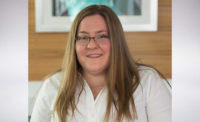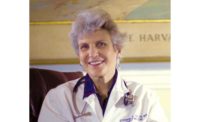Name: Rebecca Ellis
Age: 57
Title: President, Questions & Solutions Engineering Inc.
Educational Experience: M.S. mechanical engineering, Massachusetts Institute of Technology; B.S. mechanical engineering, University of Minnesota (freshman and sophomore year were completed at Northwestern University).
Professional Credentials/Accreditations: P.E. in 16 states; Certified Commissioning Professional, Building Commissioning Association (BCA); Building Commissioning Professional, ASHRAE; Certified Commissioning Authority (AABC Commissioning Group); LEED AP BD+C
Organizational Affiliations/Achievements/Awards: American Society of Heating, Ventilating, & Air Conditioning Engineers; Building Commissioning Association; AABC Commissioning Group; United States Green Building Council; and Women’s Business Enterprise National Council.
When did you fall in love with engineering?
I decided on mechanical engineering between my junior and senior years of high school, but I fell in love with it during my junior year of college, when I had my first class in building energy systems. I petitioned out of all of my remaining less-relevant engineering prerequisites (advanced dynamics, machine design, etc.) in order to take as many building systems and energy-related courses (air conditioning systems, solar energy, wind energy, etc.) as possible.
What has been the most rewarding aspect of working in the skilled trades?
Training and mentoring young engineers and watching them develop and contribute to improved new and existing building systems performance and energy efficiency is the most rewarding aspect of my career. It’s also fun to see my early trainees now training the next generation. I feel like we are making a real and lasting dent in the 40 percent of energy consumption attributed to buildings.
What challenges do women face in this profession? Why aren’t there more women in engineering?
I understand there are still a number of large and conservative engineering firms and industries where it is difficult to be a woman engineer due to ingrained prejudices and preconceived ideas about women’s abilities and/or place in society. I cannot speak to those situations, because I have avoided large companies for most of my career.
I struggle to understand the reasons why there are not more women in engineering. My daughter is a college freshman in engineering, and I have had the opportunity to watch her friends grow up over the past decade. There are many good, smart, and talented kids but only two of about 60 girls in her high school class have gone to college with plans to major in engineering.
I think part of the problem continues to lie in society’s definition of feminine; i.e., being math- and science-smart is more of a detriment to overcome than a benefit to celebrate. In addition, I think a good chunk of the issue is a relatively small pool of successful role models. We are slowly growing that pool as more and more women join and stay in the engineering work world.
Finally, I believe the educational system has a role to play, and, in general, I have seen great strides in STEM opportunities for all, including girls. The key is to make early and fun STEM experiences stick and survive the vagaries of adolescence.
I believe it is the responsibility of us earlier trailblazers to reach out to young women, engage them in our work experiences, and demonstrate our enthusiasm so they can see for themselves what great fun it is. I selected my first job after graduate school at a small firm because my immediate supervisor was a woman engineer. I am grateful for her hands-on mentorship and for that firm’s management who had no problem putting a woman in a senior position.
Describe what your job entails on a day-to-day basis.
Every day is different, and that’s part of why engineering remains interesting to me after 35 years. Currently, my days are a mixture of project work, marketing work, training other engineers, and general administrative activities necessary to keep the business solvent.
The project work is everything from technical reviews to team meetings to field testing to writing reports. Every building, its systems, and its people are different, making the project work perpetually interesting.
Marketing work includes writing scope and fee proposals for new work with existing clients or responding to formal requests for proposals from new clients. I also spend time meeting with potential and existing clients, speaking at industry events, and writing my monthly Engineered Systems magazine column.
Working with new employees and/or new engineers is one of the most fun and rewarding things I do. Most of the training is on-the-job with a trainee shadowing me through normal project work and participating as they become more comfortable. I love sharing my joy in technical challenges and the application of the laws of physics to optimizing building systems.
Although my husband/business partner does most of the heavy lifting with regards to running the business, I review timesheets and expenses, participate in the monthly invoicing process, and contribute to the tactical and strategic decisions for our company.
Being in and out of the office goes in waves, but I estimate on average I am out to project and marketing activities approximately 40 percent of the time.
What drives/motivates you every day?
The opportunity to solve problems for clients and the challenge of being responsible for the livelihoods of a full company of engineers and their families is what motivates me.
Describe the proudest moment in your career.
It has been a long career and it is impossible to identify just one proudest moment. However, all of those moments share the same characteristic; facing a situation I’d never dealt with before and coming through it successfully. It would have been easy to say no to things I hadn’t done before, but these were the opportunities to grow as both an engineer and a business professional.
What remains on your engineering bucket list — what do you aspire to do that you haven’t done yet?
I would like to be involved in a project whose BIM database survives design and construction and is successfully used by the facilities operations group to manage, maintain, and operate the building and its systems indefinitely.
What’s one thing no one knows about you?
I was a member of the Northwestern University Marching Band for two years.
List any mentors who’ve helped you succeed and describe exactly how they’ve shaped your success.
Dorothy (Dori) Wolfe, P.E., was my first HVAC mentor and the reason I selected a small consulting firm after graduate school. She was a senior associate there and that told me a lot about how management felt about women engineers and their potential. Dori was a role model in both how to behave as a consultant and how to do everything HVAC (size ductwork, size piping, select equipment, produce bidding documents, etc.). She was totally confident and never once indicated that being a woman engineer was different from being a man engineer. She set the stage for my confidence in myself and what I know, regardless of other people’s overt or covert attitudes.
What does the future hold for you?
I am in a very comfortable place in my career and look forward to years of the same. I intend to have other people (my trainees and proteges) take on more and more of the business development and technical leadership work so that the business remains sustainable beyond my ability to contribute fully.
What advice do you have for prospective female engineers considering entering the field?
Find work where there are other women engineers. Embrace your differences, particularly with respect to communications, empathy, and humility. Be open to and welcoming of input from people with more experience, regardless of how many letters they have after their names. Understand that your college engineering degree has set the stage for technical problem solving of all sorts. However, for the most part, it’s not until your first job (or internship) that you will learn and be trained on how to apply those base concepts to a particular business or nonprofit goal. You are not expected (and you should not expect it of yourself) to know everything you need to know to be a great engineer immediately after graduating from college. Do not let anyone shake your confidence in yourself.




